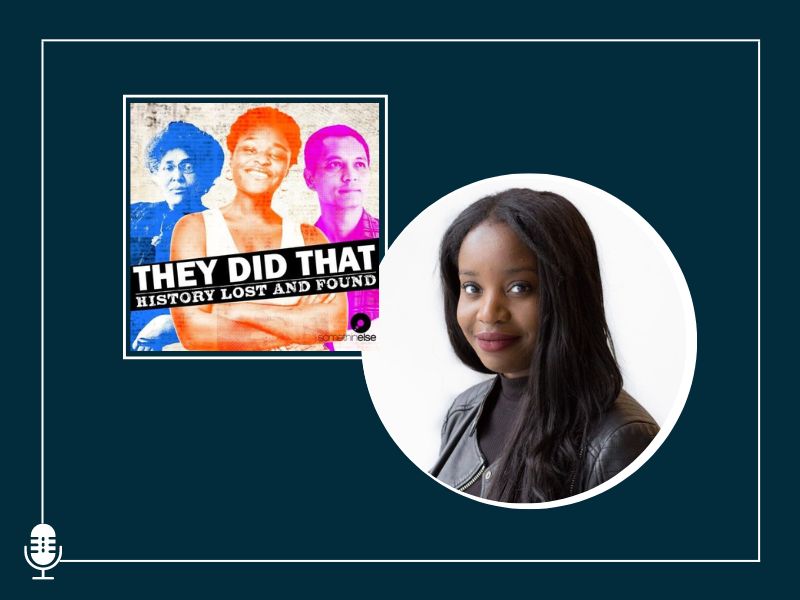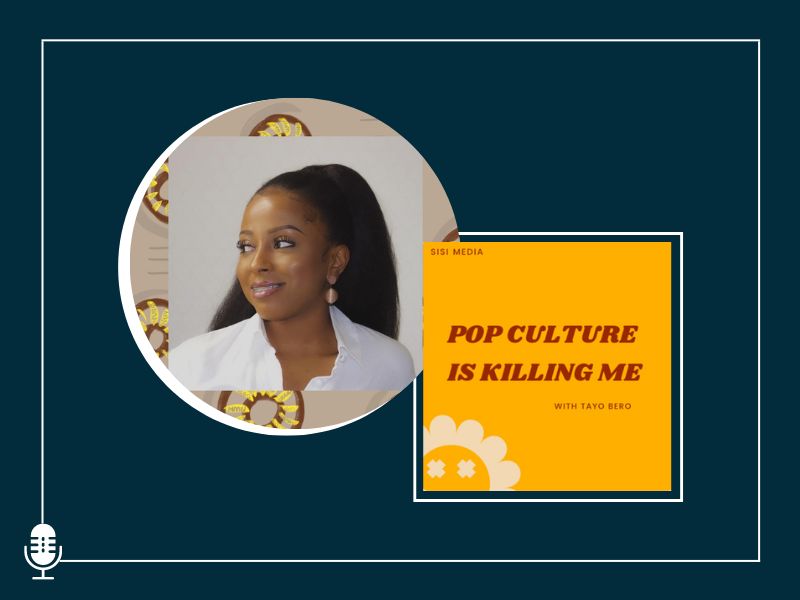New podcasts from j-school alumni

One of the appealing aspects of podcasting is ‘anyone can do it, from anywhere.’ But it feels even more appealing when a big name like Sony Music Entertainment invites you to host a podcast. That’s what happened to Takara Small, ‘10, earlier this year. And in November, the innovation and technology journalist launched her new series, They Did That (external link) . The show aims to highlight the creative work of innovators that were never given their rightful recognition, particularly those who were a part of marginalized communities.
For a decade, Small has written for the BBC, Fortune Magazine, Financial Post and Metroland, and worked on podcasts for the CBC, The Globe and Mail, and The Walrus. She’s also teaching entrepreneurship and coding skills to students in underserved communities as the founder of VentureKids (external link) , a Toronto-based nonprofit. In 2020, Small was recognized as one of Canada's 100 Most Powerful Women (external link) .
What pushed you to venture out and produce this latest series? Where did that drive and inspiration come from?
I have worked in the podcast space for quite a bit and I have always loved the idea that in audio you can introduce different voices and do scenes in a really organic and interactive way that in my print writing, you were not always able to do. I have been covering the tech space for a very long time, and when you do that, you get to meet really interesting characters: people who have contributed to products and inventions that have changed the world (but) they are not always well known. With this series, we focused on those people: people who are underrepresented, people who have been deliberately ignored, forgotten and overlooked. I was just very fortunate that Sony Music Entertainment was interested in this idea, backed it and saw the value in making it. We are interested in highlighting stories of all kinds, not just from the past or North America, we have upcoming stories about people from all around the world.
How long has this podcast been in the works for you?
Initially, the first conversation started in March when I was in New York City and was invited to the Sony offices. They were really open to hearing some of my ideas and I have to shout out some names: Tom Koenig (VP US podcasts at Somethin' Else/Sony Music) and Lizzy Jacobs (executive producer, head of narrative nonfiction at Somethin' Else). It's kind of unusual to have someone of that calibre being like, “Hey, do you want to meet up?” and I did. It was like fireworks went off, Lizzie and Tom were just so interested and excited. We started working on the series around July, and the podcast launched in October.
What is the importance of sharing those stories, and placing that recognition back into the hands of the people who it belongs to?
There is the common phrase, “see it to believe it.” I think if young people are able to see themselves in our heroes, in our scientists, in our creators and inventors, then that will inspire an entirely new generation. It's important to tell history, in its full entirety. As a journalist, I have always found it really interesting when you are able to uncover a story and bring it to the public and you are able to dig, find these interesting facts about people, places and things. I think people will find something in it, regardless of where they live, what age they are, and what their interests are.
In one particular story that's already aired, we have a woman named Alice Ball (external link) and she created a treatment for Hansen's disease (leprosy) and died quite early. Her boss took credit for her work and was labelled a hero and as a Black woman she never really gained any recognition nor was she acknowledged until later (in the last decade or so). There are so many people who have been ignored from underrepresented groups and we are really excited to shed light on these people and what they have done.
Picture yourself as a student again. What advice would you give yourself and what advice would you give students who are aspiring to follow a career in audio and podcasting?
When I was pursuing my degree in journalism, I was trying everything I could. I was volunteering and interning at as many places as possible because I wanted to have experience before I graduated. A lot of the skills I learned on the job, so just be prepared that there is only so much you can learn in school. The industry is changing all the time, so if you want to go into audio or podcasting, make sure you understand at least the other aspects of the industry because you are going to be expected to do a little bit of everything - I'm the host, and I still had to learn how to do to cut tape, research and fact check. Journalism is an incredibly competitive and challenging landscape, so don't judge your self-worth based on where you work. Those things don't matter but producing great work does. Also, graduates should look for work outside of Canada, there are so many well paying opportunities outside of the country. I'm doing this show with Sony, which is in New York, in partnership with a company called Somethin' Else in the United Kingdom. There is a whole world out there and your skills are in demand.

While Tayo Bero’s new podcast series is called Pop culture is killing me (external link) , she says she’s actually obsessed with film, books and TV. Bero ‘16 has been producing for CBC, writing a regular column for The Guardian and writing for publications such as Women’s Health Magazine, Refinery 29 and Vice. Bero is also the founder and editor-in-chief of Sisi Magazine (external link) , a quarterly magazine dedicated to Black womxnhood.
If you could describe your latest podcast in one line, what would it be? How is it different from other pop culture commentary podcasts?
I would describe this podcast as a pop culture commentary meets therapy session.
I started this podcast for journalists, artists, writers, thinkers and commentators - people who are involved in the pop culture space in their work so that they could talk about what it means to work in this industry, but also for artists to talk about what it means to actually make this art. [It is about] the different ways that pop culture as a facet of our society intersects with real lives, whether we are consuming it or whether we are commenting on it.
What has been your favourite part of working on this show?
Honestly, I think just doing it. This is a passion project, it was really important that when I was making the show (it was) something that I was going to enjoy doing. A lot of the time in the media, because our work is so visible, we are very focused on certain kinds of metrics such as how many shares has it gotten, how many downloads, etc. Coming into the process, I was very intentional about the fact that I was making this podcast because I wanted to make it and not (purely) because I wanted it to be seen. I want people to listen to it, enjoy it and, I want to build a community around it.
You are not afraid to be honest and open about your take on certain topics. What would your advice be to students in the program who want to follow a similar path of opinion writing but may be hesitant to share their views?
Get comfortable with your voice right now, get comfortable with your truth and your stance. Not everyone will go into social justice writing, but there is a core truth and ethics that are at the heart of what everyone wants to do in this profession. Whether you are writing about anti-racism, climate change, lifestyle, sports, etc. I think getting confident with your own views and doing that kind of work before you even put anything out there is important.
There will be pushback and there will be moments that make you question this job and question whether there is even any point to doing some of this work. This is a job where your work is very visible, and you will hear back from people and not all those people will agree with you. A huge part of doing this job has been reminding myself: ‘what are your values?’ And ‘what are your principles? Why are you doing this?’ I think having that as your north star will take you very far.
Picture yourself as a student again. What advice would you give yourself?
Try more things! When I was at (TMU) I was very much a student: I was going to class and fulfilling the requirements in a very academic sense. I would have done a bit more groundwork. I looked at a lot of my classmates who did all the internships and wrote at The Eyeopener, so I felt very behind. I know that no journey is the same and I still ended up where I wanted to be but, if I could go back, I would immerse myself in more experiences outside of the classroom to feel more confident as a journalist before I got out in the real world.